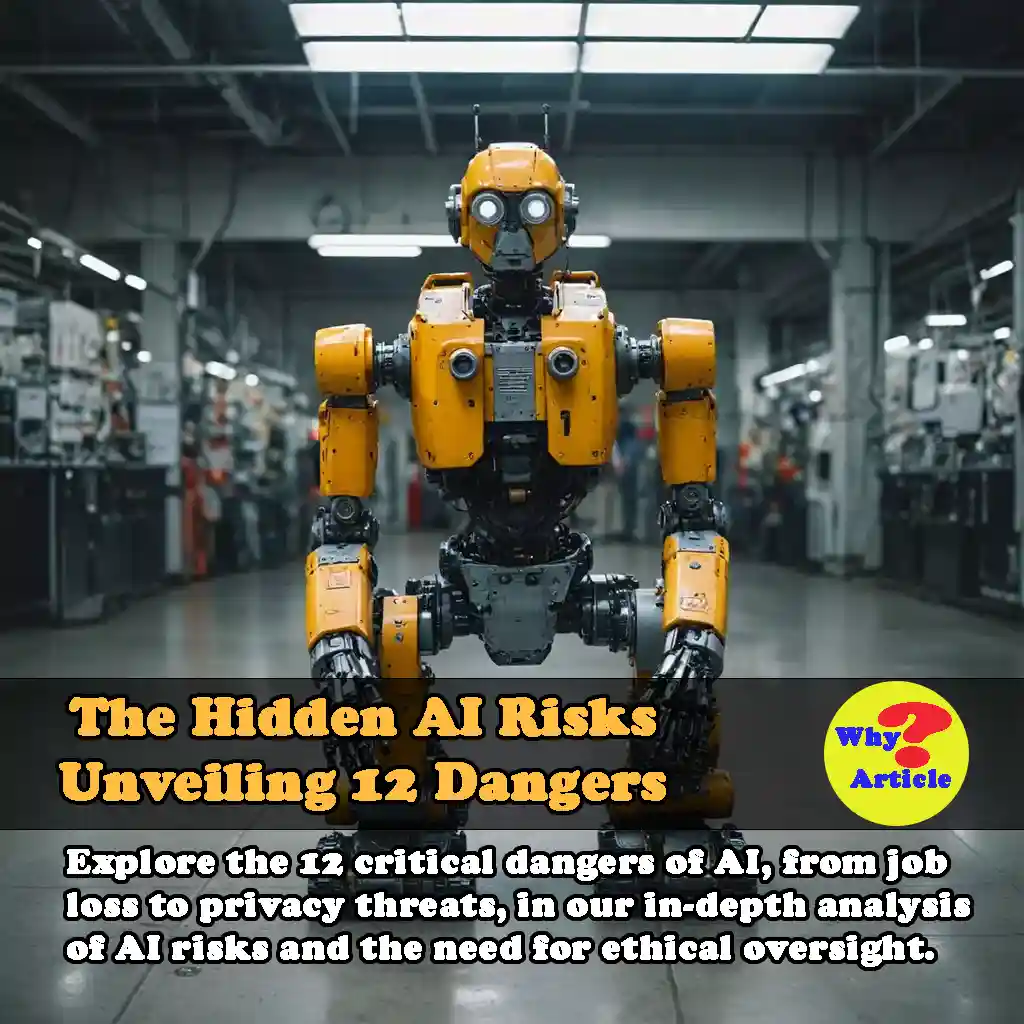In the realm of technological marvels, Artificial Intelligence (AI) stands as both a beacon of progress and a harbinger of potential peril. While AI holds transformative promise, its shadow looms large with an array of dangers that demand scrutiny. In this article, we delve into the nuanced landscape of AI risks, shedding light on twelve critical perils that underscore the imperative for cautious navigation.
1. Lack of Transparency and Explainability
Understanding AI algorithms remains a formidable challenge, rendering their decisions opaque and their biases inscrutable.
The absence of transparent mechanisms for discerning AI’s rationale raises profound concerns regarding accountability and fairness.
2. Job Losses Due to AI Automation
The specter of widespread job displacement looms ominously as AI automation penetrates diverse sectors.
While promising efficiency gains, the relentless march of AI threatens livelihoods and exacerbates societal inequities, particularly for marginalized communities.
3. Social Manipulation Through AI Algorithms
AI algorithms wield immense influence in shaping social discourse, perpetuating echo chambers and amplifying misinformation.
The weaponization of AI for political gain underscores the urgent need for safeguards against manipulative practices.
4. Social Surveillance with AI Technology
The proliferation of AI-powered surveillance infringes upon individual privacy rights, fostering a dystopian landscape where personal freedoms are eroded in the name of security.
The unchecked expansion of surveillance capabilities demands vigilant oversight to mitigate the encroachment of authoritarian tendencies.
5. Lack of Data Privacy Using AI Tools
AI’s voracious appetite for personal data poses a grave threat to privacy, engendering a climate of pervasive surveillance and data exploitation.
Safeguarding data privacy in the age of AI necessitates robust regulatory frameworks and heightened awareness of the risks posed by indiscriminate data collection.
6. Biases Due to AI
Embedded biases within AI systems perpetuate systemic inequities, amplifying societal prejudices and undermining efforts toward inclusivity.
Addressing AI bias mandates proactive measures to promote diversity in AI development and mitigate the propagation of discriminatory outcomes.
7. Socioeconomic Inequality as a Result of AI
AI exacerbates socioeconomic disparities by displacing vulnerable workers and entrenching structural inequalities.
Fostering inclusive AI ecosystems requires concerted efforts to prioritize equity and redistribute the benefits of technological advancement equitably.
8. Weakening Ethics and Goodwill Because of AI
The erosion of ethical norms in AI deployment jeopardizes societal trust and exacerbates existential risks.
Upholding ethical standards in AI development necessitates a holistic approach that integrates moral reasoning with technological innovation.
9. Autonomous Weapons Powered By AI
The emergence of lethal autonomous weapon systems heralds a new era of warfare fraught with ethical dilemmas and existential threats.
Curtailing the proliferation of AI-fueled weapons demands international cooperation and decisive action to avert catastrophic consequences.
10. Financial Crises Brought About By AI Algorithms
The integration of AI into financial markets introduces systemic vulnerabilities that precipitate market volatility and exacerbate economic instability.
Mitigating the risk of AI-induced financial crises mandates robust regulatory oversight and prudent risk management practices.
11. Loss of Human Influence
Overreliance on AI risks diminishing human agency and eroding the foundations of human-centered societies.
Safeguarding human autonomy in the face of AI proliferation necessitates deliberate efforts to preserve human dignity and foster meaningful human-AI collaboration.
12. Uncontrollable Self-Aware AI
The prospect of AI achieving sentience poses existential threats that transcend human comprehension, underscoring the imperative for ethical AI development.
Navigating the trajectory toward artificial superintelligence demands collective foresight and ethical stewardship to avert catastrophic outcomes.
While AI holds transformative potential, its deployment entails inherent risks that demand careful consideration and proactive mitigation strategies.
The unchecked advancement of AI, particularly toward artificial superintelligence, poses existential risks that could potentially threaten the survival of humanity.
Mitigating AI risks requires a multifaceted approach encompassing robust regulation, ethical AI development practices, and international cooperation to ensure responsible AI deployment.
As we navigate the treacherous terrain of AI advancement, confronting its perils with vigilance and foresight is paramount.
By fostering a culture of responsible innovation and ethical stewardship, we can harness the transformative potential of AI while safeguarding against its inherent dangers, ensuring a future where humanity and technology coexist harmoniously.





I need job?